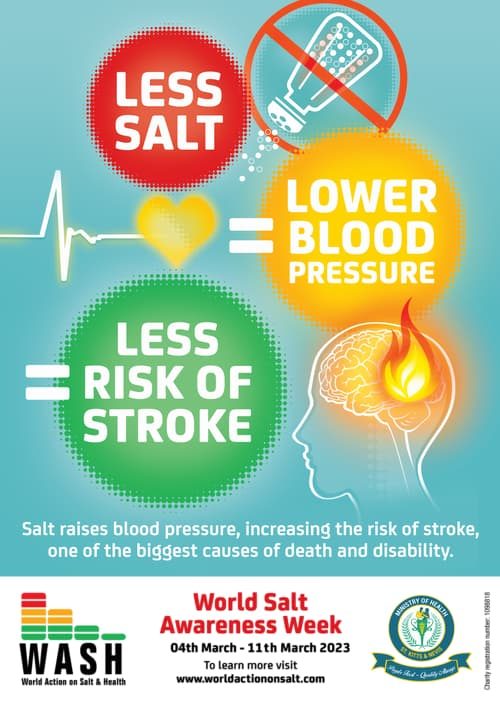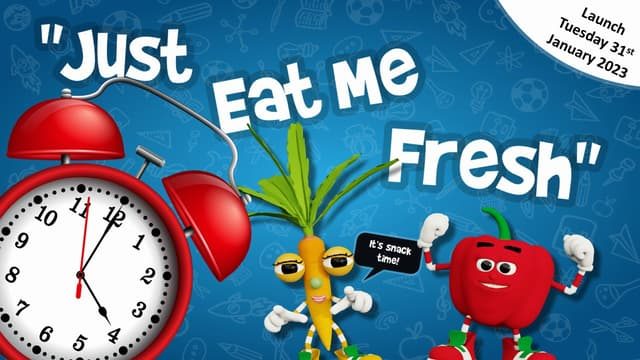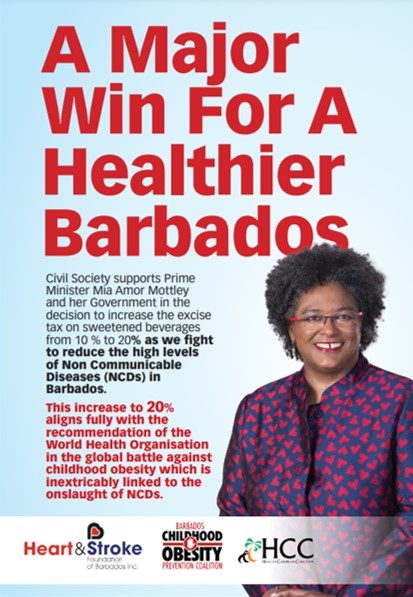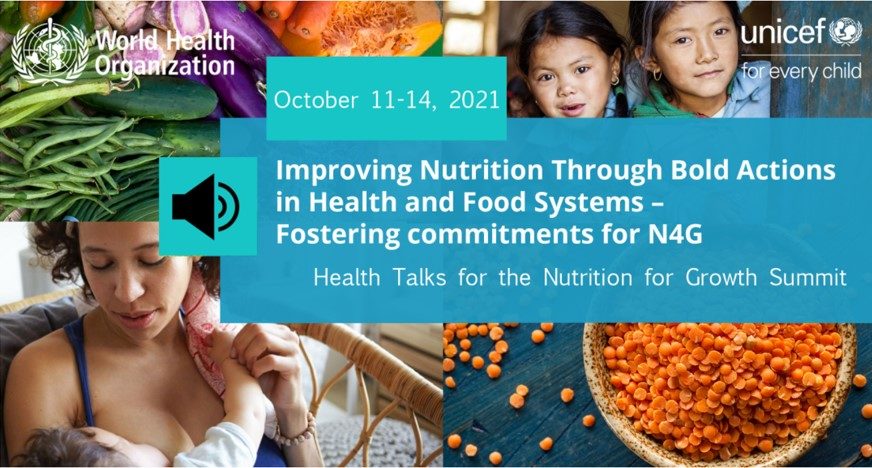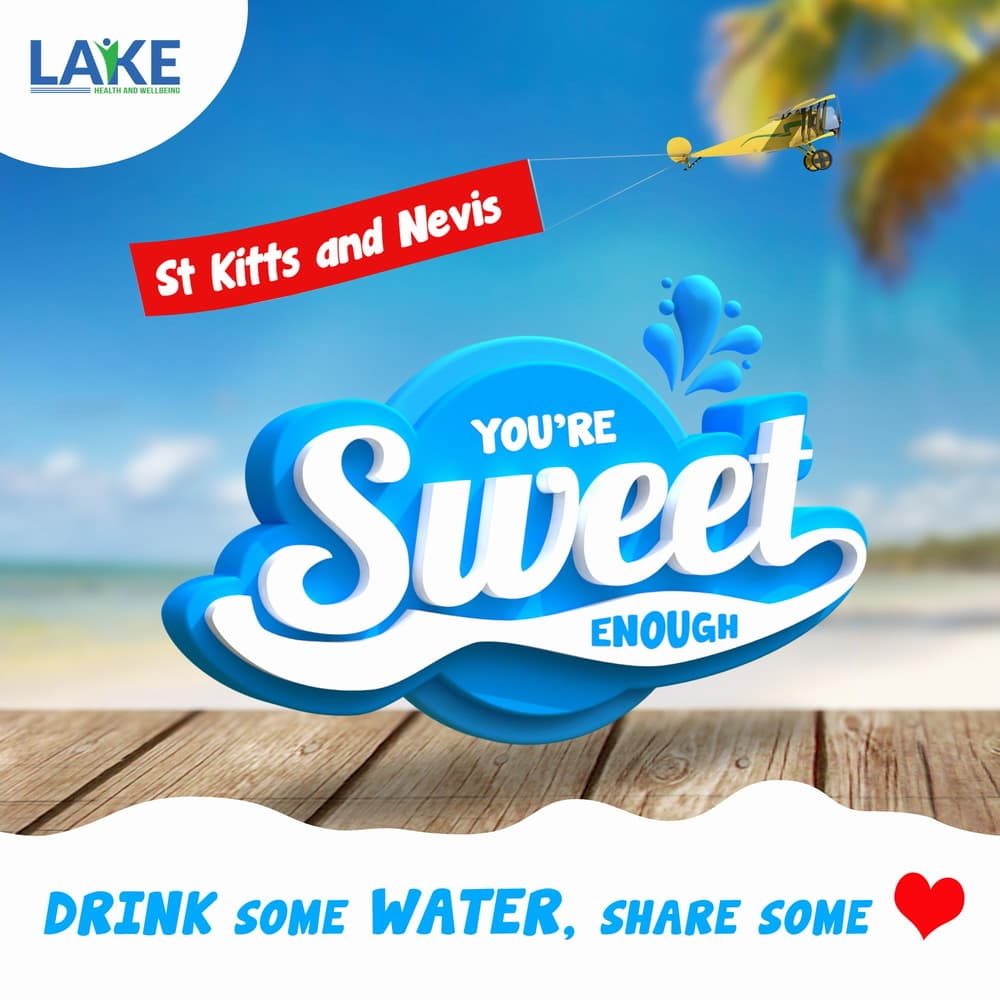Tackling Childhood Obesity Through Creative Approaches
We are happy to announce that our organisation has received a Creative Caribbean grant for our My Healthy Heroes project.
We are happy to announce that our organisation has received a Creative Caribbean grant for our My Healthy Heroes project.
Salt Awareness Week is an annual event held every March to raise awareness about the dangers of consuming too much salt and the importance of reducing our salt intake. This year, Salt Awareness Week takes place from March 4th to March 11th.
Excessive salt consumption is a significant public health issue that is linked to a range of health problems such as high blood pressure, heart disease, stroke, and kidney disease. These non-communicable diseases (NCDs) are a growing concern in many countries worldwide, including St. Kitts and Nevis.
The World Health Organization recommends that adults should consume no more than 5 grams (about one teaspoon) of salt per day. However, the average person consumes much more than this amount, often without realizing it. Many processed and packaged foods, as well as restaurant meals, contain high amounts of salt.
Reducing salt intake is crucial to maintaining good health and preventing NCDs. Here are some useful tips to help you reduce your salt consumption:
In addition to these tips, it’s essential to be aware of the salt content of restaurant meals. Many restaurant dishes, especially fast food, are high in salt. If you eat out frequently, try to choose lower-salt options, or ask for your food to be prepared without added salt.
During Salt Awareness Week, we’re reminded of the importance of reducing our salt intake to maintain good health and prevent NCDs. By making small changes to our diet and lifestyle, we can reduce our risk of developing these conditions and live healthier, happier lives.
On 31st January 2023, Lake health and Wellbeing in partnership with the ICDF and the Ministry of Education’s Curriculum Development Unit launched a short animation, ‘Just Eat Me Fresh.
The animation was developed as part of our efforts to tackle the high rate of childhood obesity which is a major public health issue in the Caribbean with 1 in 3 children being overweight or obese. The rate of childhood obesity in the Caribbean is higher than the global average and is reported to be on the rise.
Childhood obesity is a significant challenge here in St Kitts and Nevis. A PAHO report revealed that 33% of secondary school children in the twin-island state were overweight and 14% were obese. More recently, in 2017, a UNICEF report published that 26% of children in St Kitts and Nevis are obese.
Data has demonstrated that NCDs are becoming an epidemic in the Federation with over 80% of illnesses and deaths in St Kitts and Nevis being due to these conditions. We must do something about this to prevent our citizens from dying prematurely and one approach is to tackle childhood obesity.
To combat childhood obesity, we have to ensure that children adopt a healthy lifestyle, and we also have to create a healthy environment at schools, in homes and within society so that children can make healthy choices.
Our animation, Just Eat Me Fresh, aims to promote a culture of healthy snacking by encouraging children and their parents to opt for fresh fruits and vegetables as snacks rather than ultra-processed, unhealthy snacks that are high in sugar, salt and saturated fat. This animation can be used in the school environment, at home and in the community to educate young people on the importance of adopting healthy behaviours.
Just Eat Me Fresh forms part of a set of resources that we have started to create which falls under our My Healthy Heroes programme, through this work we’re aiming to create engaging resources to support teaching children about healthy eating.
To find out more about this work and how you can use this animation in your school, you can email us
We had a great time at the launch event which featured a special performance of the animation’s song and dance by grade 3 students of the Seventh Day Adventist Church as well as speeches and presentations by:
You can watch a recording of the launch event below.
In 2015, Barbados was one of the first countries in the world to introduce a tax on sweetened beverages (SBs). This measure was introduced as part of the country’s strategy to tackle the high rate of non-communicable diseases (NCDs). Specifically, this tax aimed to encourage healthier consumption patterns by creating a financial deterrent to the purchase of sweetened beverages which would then nudge consumers to select healthier beverages. Furthermore, an additional benefit of the tax was the projection that it would raise in excess of $BB10 million and thus contribute positively to the economy.
Across the world, sugar-sweetened beverages have been the target of NCD prevention and control strategies and this is because of the growing body of evidence linking SBs to overweight, obesity and the development of NCDs. Research has shown that consuming one serving of an SB per day is linked to a 13% higher risk of developing type 2 diabetes and a 39% increase in non-alcoholic fatty liver disease4. Additionally, frequent consumption is associated with a 9% increase in cardiovascular disease risk and a two-fold increased risk of developing gout, and finally, studies have linked the overconsumption of SBs to an increased risk of developing some cancers4.
In order to protect the public from the health-harms of SBs, the World Health Organisation (WHO), the Pan American Health Organisation (PAHO) and the Caribbean Public Health Agency (CARPHA), recommend that governments implement a range of SBs policies, and this includes a tax of at least 20% on SBs. This rate of tax is being recommended by health authorities because an SB tax needs to be high enough to act as an effective deterrent to the purchase of all SBs and 20% has been found to be sufficiently high enough to ensure a significant reduction in purchases.
At 10%, Barbados’ SSB tax was below the recommended rate and in March 2022, the Prime Minister of Barbados, Hon Mia Mottley announced that from 1st April 2022 the SB tax will be raised to 20%. This was in recognition of the fact that more could be achieved with respect to promoting healthier drinking habits if the tax rate was in line with best practices.
Despite the low rate of tax in Barbados, research has shown some positive outcomes with regard to consumer behaviour. For example, since the introduction of the tax, there has been a 4% decrease in the sales of SBs and a 3.6% decrease in the purchase of carbonated SBs1. Additionally, there was a 5.2% increase in non-SBs sales and a 7.5% increase in bottled water sales1. There was some evidence of consumers switching to cheaper SBs; transitioning to the higher rate of 20% could tackle this issue.
Recently, in October 2018, another Caribbean country, Bermuda, joined Barbados and introduced a 50% tax on sugary soft drinks, candies and pure-sugar imports which was increased to 75% in 2019 and was expanded to include food products with cocoa. In a study conducted by Imperial College, 48% of Bermudians reported consuming fewer taxed products and the revenue raised between 1st October 2018 and 1st December 2019 was $5.4M2. This revenue was used for health and wellness initiatives such as exercise promotion, free health screening and subsidising fruits and vegetables2,3.
The increase in Barbados’ SB tax is a good step towards transforming consumer behaviour and promoting healthier drinking habits. It is anticipated that the increase in taxation will lead to a further reduction in the public’s SB consumption thereby reducing the public’s exposure to added sugar leading to a reduction in calorie intake and a reduction in NCD risk.
Since 2015, more countries around the world have introduced SB taxation as part of their NCD prevention and control strategies with over 50 countries now utilising this fiscal measure. This demonstrates the concern that countries have with the consumption of SBs and pairing this policy with other policies such as front-of-package warning labels and restricting the sale and marketing of SBs will contribute to eliminating a key risk factor for NCDs and thus improve the health of the public.
Over here in St. Kitts and Nevis, the Ministry of Health is working towards the implementation of their SB policy this year. We are in support of the Ministry’s policy and encourage Cabinet to approve this policy when it is presented to them so that concrete and effective steps can be taken to promote healthier drinking habits.
Many of us grew up with the notion that a small amount of red wine is good for the heart and can decrease our risk of developing heart disease, but a new policy brief published by the World Heart Federation (WHF) has corrected this myth.
In their brief, the WHF highlights the mounting evidence that has led to the fairly recent conclusion by global health researchers and the World Health Organisation that there is no safe level of alcohol consumption; any level of alcohol consumption affects our health.
In recent years, researchers have shown that alcohol consumption is linked to an increased risk of developing non-communicable diseases such as cancer, cardiovascular disease, digestive diseases, and intentional and unintentional injuries and some communicable diseases. Additionally, consuming even small amounts of alcohol can increase our risk of stroke, heart failure, coronary disease and other cardiovascular diseases.

If alcohol is so harmful to our health, then how did many of us come to believe that alcohol is beneficial to the health of our heart? The WHF’s policy brief explains that over the past thirty years some researchers, the alcohol industry and the media have been aggressively promoting the misleading message that alcohol can prolong life by reducing our risk of cardiovascular disease, with them pushing that red wine, in particular, is a heart-healthy beverage because of its resveratrol content and other alcoholic beverages are heart-healthy because of their high-density lipoprotein ( HDL) content. The WHF policy brief explains that these claims have now been refuted with high-quality research that shows the many negative health outcomes of consuming any amount of alcohol.
As part of their policy brief the WHF is calling for stricter alcohol restrictions and are specifically recommending the following with regards to advocating for change:
We applaud the WHF on publishing this policy brief and dispelling a very pervasive and harmful myth about alcohol. We hope that everyone – policymakers and the public- acts on this information and works towards eliminating the consumption of alcohol. From our point of view, we encourage healthy drinking and recommend that everyone select water as their drink of choice and both reduce their sugar-sweetened beverage consumption and abstain from alcohol.
For more information, you can read the WHF policy brief here and you can find out about our healthy drinking campaign, You’re Sweet Enough here.
.
On 1st January 2022, popular soca artist Patrice Roberts released the video for her new song, Mind Your Business. We listened with great interest when the song started and we heard the catchy chorus of ‘Drink Water and Mind Your Business’ and thought with pleasant surprise: ‘Wow! Now that’s different!’
For us, this song was well-timed because, for the past year, we have been running a public health campaign entitled ‘You’re Sweet Enough.’ This campaign aims to educate the public about the health impact of consuming too many sugar-sweetened beverages (SSBs) as research has shown that the overconsumption of these types of beverages is linked to weight gain, obesity and the development of non-communicable diseases like type 2 diabetes, heart diseases and hypertension.
A major part of our campaign focuses on encouraging the public to reduce their SSB consumption and to drink water instead. And, in order to encourage this behaviour change, we have explored various avenues including composing a catchy jingle, utilising animation, hosting public engagement events and advocating for evidence-based health policies that have been shown to be effective at reducing the public’s consumption of SSBs; policies such as an SSB tax, restricting the sale and marketing of SSBs in and around schools and front of package warning labels. Whilst this all-encompassing approach is making a difference, we are competing with the high volume of marketing of unhealthy foods and beverages, and there is a need to see how these messages can be balanced with more healthy lifestyle messages in mainstream media. In the Caribbean region, one way to do this is to use music to reach a wide audience as music, particularly soca music, is ingrained in our culture.
Therefore, through our jingle, we worked with local artist Dejour, who provided the vocals for our jingle, to help amplify our campaign message in a fun and engaging way. Through music, we were able to reach all age groups and genders, and we were able to extend the message further through dance. In essence, we were able to link a positive health message to ‘coolness’ and, through our ‘catchy’ jingle, the healthy drinking message of our campaign was remembered by our audience with members of the public anecdotally reporting that they remembered the jingle when they were making beverage purchases or they sang the jingle to their children to encourage them to select water.
In order to build on this success, we need more positive health messages in the mainstream that amplify our healthy drinking message. Enter: ‘Drink Water and Mind You Business’ by Patrice Roberts.
As mentioned previously, we were very surprised, and pleasantly so, by Patrice Roberts’ new song. We were surprised because, historically, when we explore the messages of mainstream music, when it comes to lifestyle habits, the messages predominantly promote unhealthy behaviours. Specifically, when we look at drinking messages in music, many songs promote the consumption, and most times, the overconsumption of alcohol. For example, a study conducted by the Boston School of Public Health reviewed 720 songs from Billboard Magazine’s year-end charts from 2009 to 2011 and found that 23% of songs mentioned alcohol and that urban music (rap, hip hop and R&B – the genres of music that we are more likely to listen to in the Caribbean) had the highest percentage of alcohol mentions, with 38% of these songs referencing alcohol. Additionally, when looking at Caribbean music, a Guyanese study reported that 37% of Guyanese chutney songs contain references to alcohol. Music is a powerful influential tool and research has shown that songs containing references to alcohol have a direct impact on the public’s alcohol consumption.
With this being said, we can see that music artists have an important role to play when it comes to promoting healthy habits. Through responsible songwriting and music video creation, they can positively influence the behaviour of their fans and improve their health and wellbeing. Let’s take a look at Patrice Roberts’ new song as an example. Since 1st January 2022, this song has garnered almost half a million views on YouTube and since this time Patrice Roberts has been encouraging her fans to drink water and stay hydrated.
Patrice Roberts’ fans, in turn, have responded positively and have stated that, indeed, they too will be drinking more water this year in direct response to this new song.
“Imma sit back, drink water And mind my business!!”
“For de New Year I gon drink water and mind my business.”
“Water is life…..drinking water and minding my business.”
“Water (check), minding my business (been doing that all my life). Sounds about right to me. Great song!”
It’s early days and this isn’t too scientific, but we can see from a quick perusal of Patrice Roberts’ social media platforms that the song has had a large reach, has acted as a reminder to her fans to select water as their drink of choice this year and has created an intention amongst her fans to drink more water.
As the year progresses, we hope that more artists will make the decision to promote healthy habits amongst their fan base as for too long the music industry has glamourised negative behaviour.
We were delighted to join the In Ya Kitchen team, and members of the St Kitts Health Promotion Unit and Nevis School Meals Programme to share a few health tips to brighten the holidays. Check out this fun, informative video below.
From 11th to 14th October 2021, the Department of Nutrition and Food Safety of WHO and UNICEF hosted a week-long series of webinars that explored strategies for improving nutrition through bold actions in health and food systems.
Three of the webinars in this series aligned perfectly with the work that we’re doing to promote healthy drinking habits through our You’re Sweet Enough campaign, so we were delighted to attend to learn more about global approaches which could be applied to our local context here in St Kitts and Nevis.
The three webinars that we attended were:
In the first webinar we attended, Improving Diet Through Fiscal Policies, there was a focus on various fiscal measures to improve the diets of the public and thus improve the health of consumers. These measures included taxation of unhealthy products like sugar-sweetened beverages and subsidising healthy products. Taking us through the various measures were speakers from Mexico, South Africa, Kuwait, Saudi Arabia and Portugal who discussed the steps that their countries are taking particularly around the taxation of unhealthy foods. It was interesting to note that Saudi Arabia has introduced a sugar-sweetened beverage tax of 50% on sodas and 100% on energy drinks in order to tackle their very high rates of obesity and NCDs. These SSB tax rates are the highest SSB tax of the countries represented on the panel and have resulted in a significant reduction in purchases of SSBs showing that bold action with fiscal policies can be effective.
.
The second webinar we attended focused on labelling and marketing restrictions. This webinar featured speakers from Saudi Arabia, Mexico, Thailand, France, the UK and Chile who shared their experiences with front-of-package nutrition labelling (FOPL). Speakers touched on mandatory and voluntary approaches to front-of-package nutrition labelling and the effectiveness of FOPL in empowering consumers to easily assess the nutritional value of the foods they purchase. Additionally, speakers highlighted that the public has the right to know what is in their food and we are, currently, violating their human rights, but simple measures like labelling and restricting marketing of unhealthy foods can address this.
Finally, the third webinar we attended focused on creating a healthy school environment through comprehensive school-based policies and programmes. This was a very interesting session providing us with the opportunity to learn about projects being implemented by Ministries of Health and Education in Ghana, India and the Dominican Republic to improve the health and wellbeing of school children. These projects included measures such as providing nutritious meals in schools, health education, nutrition supplementation and disease prevention. Interesting questions were asked about how to reach children who are not in the school system and how to evaluate the impact of such programmes..
These webinars provided us with some good insight on the power of policy in improving the health of populations. In St Kitts and Nevis, the Government is currently working on developing a Federal SSB policy as part of their NCD Action Plan. This includes a collection of evidence-based approaches to reduce the public’s consumption of SSBs. We applaud the Ministry of Health for pushing forward with this policy and as part of our You’re Sweet Enough campaign we’re calling for:
Through these actions, the Government can begin to address a major risk factor for NCDs and create a healthier environment.
We look forward to seeing the Government’s SSB policy finalized and encourage Cabinet to approve the Ministry of Health’s policy so that we can improve the health of our nation.
From 22nd August to 5th September 2021, we hosted a No Sugar-Sweetened Beverage (SSB), Drink Water Challenge in collaboration with St Kitts and Nevis Ministry of Health. This challenge was part of the Ministry of Health’s seven-week SKN Moves campaign and aimed to provide a fun way to encourage the public to make healthier beverage choices.
Over forty people registered to take part in the challenge and over the two weeks, they tracked their water consumption using a water tracking app and submitted videos and pictures sharing their progress. Additionally, we set up a WhatsApp group to allow participants to encourage each other and to build a small community around the challenge.
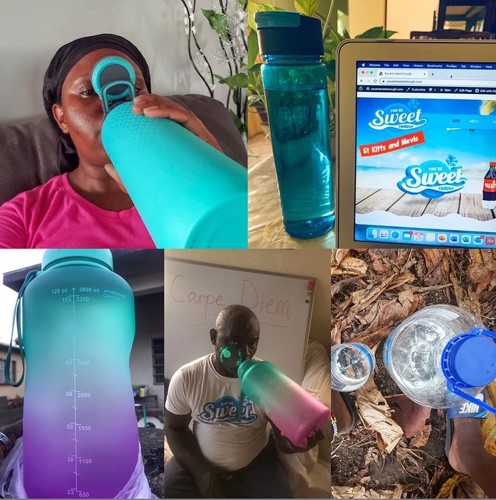

Our group of participants did a great job, remaining committed to the challenge and after reviewing their water tracking app submissions and calculating their water consumption over the two weeks, we selected three winners.
On Thursday 23rd September, our winners were awarded a certificate and prizes from Hon. Akilah Bryon-Nisbett, the Minister for Health for St Kitts and Nevis, at the first annual SKN Moves Awards Ceremony.


In addition to our prize winners, other people were recognised for participating in other challenges that were organised over the seven-week SKN Moves campaign. These included:


We were delighted to attend this inaugural event to support our winners and also to hear speeches delivered by:
All three speakers highlighted the government’s commitment to tackling NCDs with SKN Moves being just one part of their strategy. Now in its second year, the SKN Moves initiative aims to promote the prevention and control of NCDs through three core pillars: healthy eating, regular exercise and age-appropriate health checks. Furthermore, SKN Moves is part of a wider programme, Caribbean Moves, which aims to tackle the high rate of NCDs in the region through a collective approach. In addition to highlighting the SKN Moves campaign, speakers also discussed the Government’s efforts to tackle the overconsumption of sugar-sweetened beverages through their national SSB policy which is in its final stages of development.
We applaud the Ministry of Health for continuing to push forward with developing this policy which features a collection of evidence-based approaches to reduce the public’s consumption of SSBs. We look forward to seeing this policy finalized and implemented.
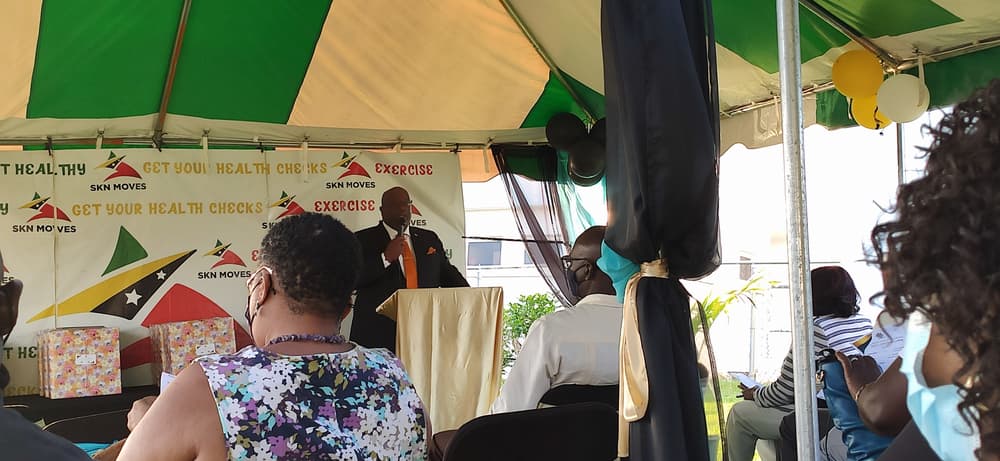

We would like to say a big thank you to everyone who took part in our No SSB, Drink Water challenge and congratulations to all our winners.
We would also like to thank the Ministry of Health’s Health Promotion Unit for inviting us to become a member of this year’s SKN Moves Committee and Open Interactive for sponsoring our orientation session for our challenge participants. We look forward to next year’s campaign.
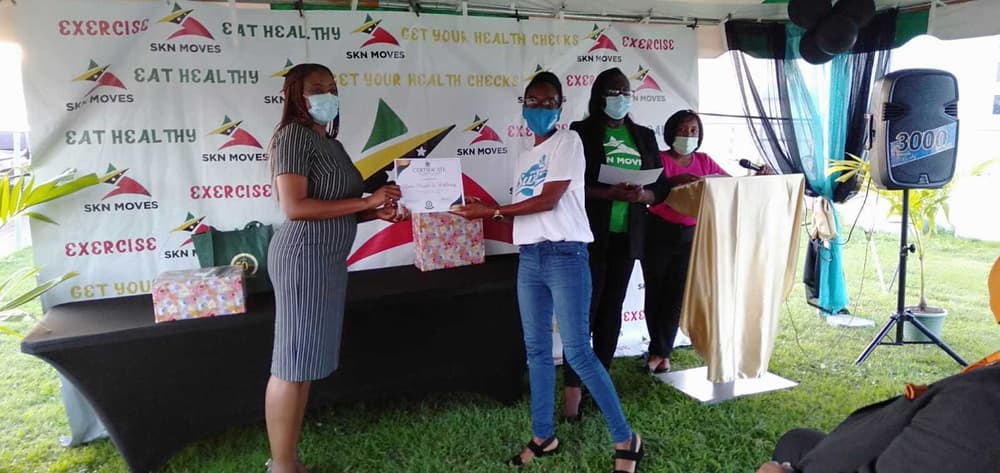

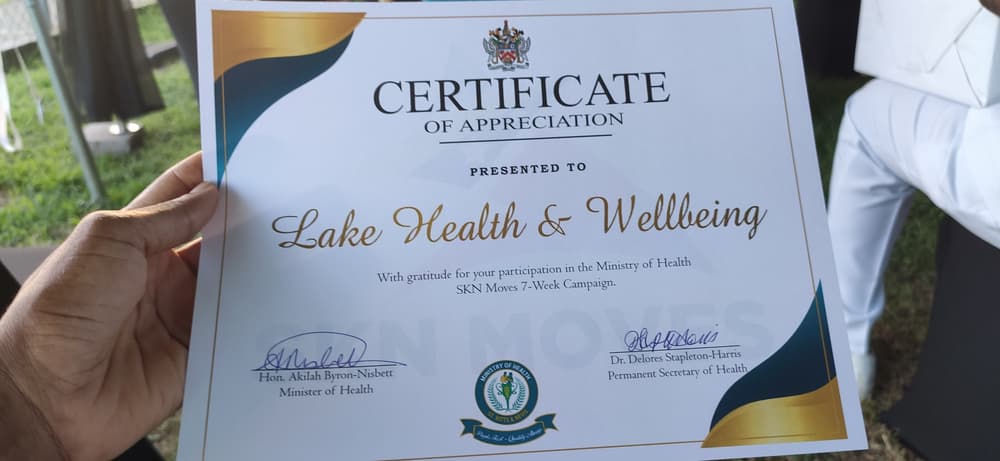

As part of our You’re Sweet Enough campaign we hosted a virtual screening of the documentary The Secrets of Sugar. This documentary exposes research results that reveal the shocking truth about sugar that the sugar industry has been hiding from consumers. You can watch this documentary below:
Following the screening, our founder, Abi Begho, and our Advocacy and Research Officer, Isalean Phillip, had an engaging discussion about the issues raised in this documentary including the food and beverage industry’s role in the obesity crisis and approaches to reducing the public’s consumption of sugar.


